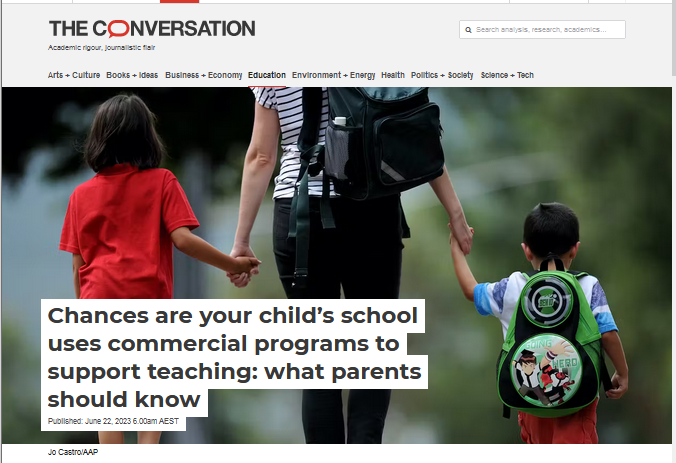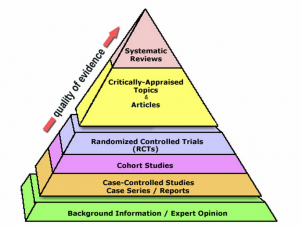Chances are your child’s school uses programs which lack strong evidence to support teaching: what parents should know
0 Replies
An article appeared in The Conversation last week called “Chances are your child’s school uses commercial programs to support teaching: what parents should know“.
At first I did a double-take. Parents should be aware, and very concerned, about the variable quality of literacy-teaching programs and approaches used in Australian schools. Many parents now know this, thanks to activism by parent, teacher and other professional groups, plus US journalist Emily Hanford’s brilliant reporting on what’s known generally as Balanced Literacy, and specifically programs by Marie Clay, Irene Fountas, Gay Su Pinnell and Lucy Caulkins.
Fountas and Pinnell’s Benchmark Assessment System and Classroom and Leveled Literacy Intervention programs, Caulkins’s Units of Study programs (all sold in Australia by Pearson), and other Balanced Literacy approaches (e.g. three-cueing, Running Records, Guided Reading, rote-memorisation of high-frequency wordlists), are widely used in Australia. A few Australian schools might still use Clay’s Reading Recovery program, despite recent research showing its long-term impact, and petitions like this one from my local Dyslexia Victoria Support (please sign if you’re in Victoria). Caulkins has now seen the scientific writing on the wall, and added systematic phonics to her early years program, but I’m not rushing out to buy it.
However, The Conversation’s authors last week, three Education academics from Edith Cowan University in WA, were not objecting to poor quality programs. They were objecting to commercial programs.
Are they just anti-commerce?
Are the authors anti-commerce in general? Do they grow their own food and make their own clothes, avoiding the stench of filthy lucre? Maybe they think all educational programs should be free. This would make writing programs the province of overworked teachers and the independently wealthy. Is earning a living writing educational programs wrong? Aren’t teachers entitled to the best available tools?
The article’s stated concern is that “the content and the way students are being taught is outsourced to a third-party provider, who is not your child’s teacher.” Interesting use of the passive tense. Outsourced by whom? Are they seriously suggesting that teachers should make, not buy, all programs? What about programs consistent with the best available scientific evidence, and extensively classroom-tested? Do they seriously think it’s OK for the nation’s children to be here’s-a-program-I-made-earlier guinea pigs?
Well, no. They write:
“It is easy to see why schools use commercial programs. They offer efficient, consistent delivery of content across year levels. They also save teachers planning time and come with ready-made resources for lessons.
But schools often adopt these programs to reduce workload or because they have become widely accepted by other schools, rather than investigating whether they are endorsed and peer-reviewed by Australian or international education experts.“
The evidence pyramid
I did another double-take. Programs “endorsed and peer-reviewed by experts” are the best schools can do?? But expert opinion is right at the bottom of the evidence pyramid. Sure, it’s better than nothing, but experts get stuff wrong all the time. We’re talking about the nation’s kiddies here. I respectfully submit that schools should focus on evidence from (ideally) the top of the evidence pyramid, much of which is readily accessible in plain-English explanations like this one from the Centre for Education Statistics and Evaluation. We should all simply ignore experts when they disagree with the best available scientific evidence.
I’m sorry, but what exactly is being argued?
The Edith Cowan academics’ article goes on to argue against (strongly evidence-based) direct instruction because of “broad understanding” that play-based experiences are better. What exactly is “broad understanding”? Once upon a time, we had a broad understanding that the earth was flat.
It says using a commercial program limits a teacher’s ability to meet individual needs. I would have thought that not staying up all night writing programs, or having to think through every aspect of their delivery, would help rather than hinder a teacher’s ability to differentiate.
And then the old chestnut: commercial programs are “taking autonomy away from teachers, while devaluing their professional knowledge and skills”. Is teacher autonomy really a core value for parents? Do the authors realise that highly-valued, knowledgeable and skilled professionals like surgeons and engineers can’t just do what they like? They must keep their checklists and procedures strictly aligned with current research and best practice, lest they be sued for malpractice or build something that falls down and kills people. Yet they’re still highly valued.
The article says teachers receive evidence-based training at university. The 2021 report of the Quality Teacher Education Review disagreed, and recommended universities improve (among other things) what they teach about reading, including phonemic awareness and phonics as essential in the early years.
Like most unconvincing articles, this one wraps up with a grab bag of unsubstantiated claims: commercial programs are generic, repetitive, irrelevant, and make it hard for kids to learn “at their natural pace” (does this mean “let the slower kids go slow?” Surely that’s a recipe for letting them fall further behind?). They could harm engagement and social and emotional development. Hmm. Links provided are to very general articles about good practice, but no research highlighting the evils of commercial programs in schools.
Hooray for all the teachers who know better, and are doing better
The teachers I talk to are hungry for information about evidence-based practice, and determined to be accountable to their students and the wider community. They’re joining groups like Reading Science in Schools in droves, and booking out Sharing Best Practice and ResearchEd events. They’re critically evaluating the programs available in their schools, dumping poor-quality ones, and replacing them with better quality programs. Some of these are free, and some are bought with money (AKA commercial).
These teachers are amazing, parents should know about them, and we should all be cheering them on.




Leave a Reply